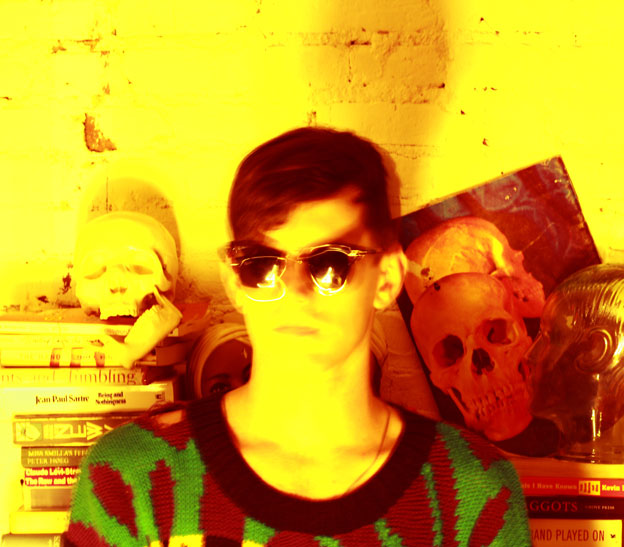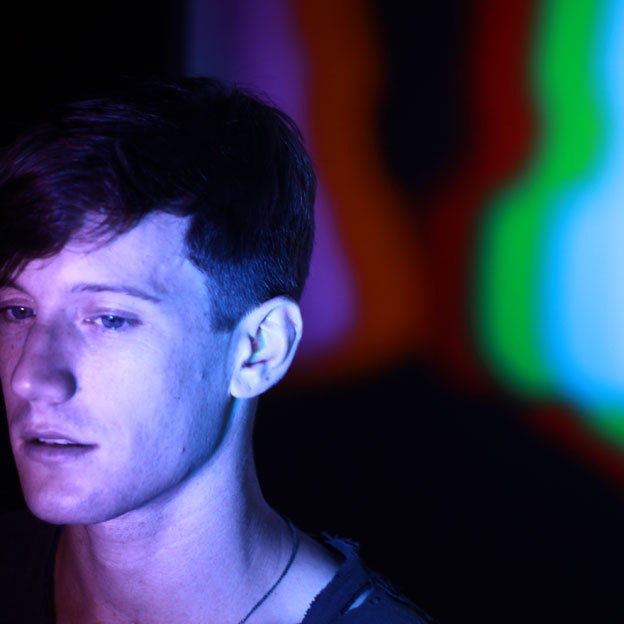ITAL - a Pitchfork interview
ITAL - a Pitchfork interview
Artistes:

Ital
New project from Mi Ami and Black Eyes veteran focuses on DIY dance music
By Andrew Ryce, February 9, 2012

Photos by Aurora Halal
Before he was Ital, Brooklyn's Daniel Martin-McCormick made poisoned synth-pop under the name Sex Worker. Prior to that, he was a member of brutal dancepunk band Mi Ami, and yet before the lead singer of hardcore punk band Black Eyes. A colorful history indeed, but as Ital, Martin-McCormick now makes delirious DIY dance music cobbled together from an array of samples and warped synth sounds. Last year he kicked off Not Not Fun's dance-oriented sublabel 100% Silk with "Ital's Theme", a charmingly catchy slice of makeshift house that overrode purist reservations with its sheer sense of joy. Since then his sound has grown steadily more confident-- marked by a shift from freeware software Audacity to the more professional Logic-- and he's moved from the outsider dance of 100% Silk to respected UK tastemaker institution Planet Mu.
This month sees the release of Ital's debut album, Hive Mind, a dense web of samples both recognizable and damaged, weaved together with effervescent synths and chugging beats, the glossiest encapsulation of his patchwork aesthetic yet. Openly embraced by dance music audiences as much as former fans from other realms, Martin-McCormick finds himself alternating between straight-up DJing-- "I just play a lot of house and disco and whatever, I'm not like super professional, it's gonna be a little bit raw"-- and an ambitious live set armed with a sampler and synth. Daniel Martin-McCormick spoke to us from a Melbourne tour stop about his move to dance music.
Pitchfork: What kind of dance music were you listening to around the time that you started Ital?
Daniel Martin-McCormick: Specifically what inspired "Ital's Theme", the first track I made as Ital, was a lot of Dutch electro: Bangkok Impact and Alden Tyrell, especially "Hills of Honolulu". That stuff is really joyful and bright, sort of explosive. I was thinking, "It'd be cool to make something that's really ebullient, not happy but joyful, in the same way as a lot of that stuff." And that was the jumping-off point.
Pitchfork: How did you get in touch with Planet Mu?
DM: I wrote them. I had already started working on the record. I sent [Mike Paradinas] the first song off of it, which was done. He was psyched.
"It's important to make sick music, and fuck everything else."

Pitchfork: So you made the Hive Mind tracks with an album in mind?
DM: Yeah, exactly. I already had a couple of 12"s out, and 12"s are really easy to get out. So I was like, "Let's do something a little more substantial." I think that's why it sounds a little different from the 12"s, because each song was being made in conversation with the last song. When you make just one song, in one sense it's more free, but it's also a bit quick-and-dirty, just boom-- you make it and go onto the next one. They can be all over the place-- one that's really poppy and one really weird. When I was working on this record, I [wanted] to advance the story, to keep it interesting for myself-- how do I want to play off [this or] that?
Pitchfork: Your sampling material is quite obvious, sometimes. Do you ever worry about running into trouble with [Lady Gaga sample], "It doesn't matter if you love him?" Is that a concern?
DM: Yes.
Pitchfork: But you just do it anyway.
DM: I just don't know what else I'm supposed to do. I guess we could try to license it. But I figure it'll probably be fine. Or not. [laughs]
"Listening to minimal techno was like eating fine brie and drinking really nice red wine. It's perfect, but that's not all there is to life."
Pitchfork: Are you using more generated sounds or synthesizer sounds now as opposed to what you were doing before?
DM: Yeah, definitely. "One Hit" is called "One Hit" because all of the melodies are one hit of this organ that's pitched up and down and time stretched. And that's just a cool thing to try.
Pitchfork: You've been accepted more and more by dance music audiences, critics, and listeners. Were you surprised by the reception from the dance music community?
DM: I didn't expect it at all. When I got into dance music around 2005, 2006, a lot of stuff was German minimal. And I liked it, but it was so clean. After a while I was like, "Good god, I'm 22 years old. I need something that has more power, more raunchiness, more raw, vital vibes." Listening to minimal techno was like eating fine brie and drinking really nice red wine. It's perfect, but that's not all there is to life. So over the past couple of years there's been this sea change, and people have started to get into all sorts of stuff, from Rustie and maximalist shit to Hieroglyphic Being-- he's really so fucking bizarre-- and the Manchester stuff on Modern Love, there's so much that's all across the board. I feel like I kind of snuck in because of that situation.

Pitchfork: Do you feel uncomfortable being lumped in with other dance music artists, or do you feel like you belong at this point?
DM: I love dancing. And I feel strange about the world of producers, because even though they are making dance music and thinking about the club and its hypnotic power, there's often real dance heads getting lost in their own world and forgetting to have fun. Producers can get uptight. But the world of dance music [is] my shit. I danced to punk when I was a kid; you dance to rap or go-go or whatever. [Dance music has] been an interest since I first got into music.
Pitchfork: And at the same time, no matter how much closer you get to being explicitly dance music, you're still viewed as a sort of outsider.
DM: The only time I've ever like felt like an insider was in Washington, D.C. I was born there, and I didn't even realize I was an insider until I left. I think sometimes you [get pegged as] a definitive artist of this genre or niche or whatever. I don't fucking care, though. It's not important. It's important to make sick music, and fuck everything else.
Entretiens plus...
House, Techno plus...
- ‹ précédent
- 9 of 15
- suivant ›
